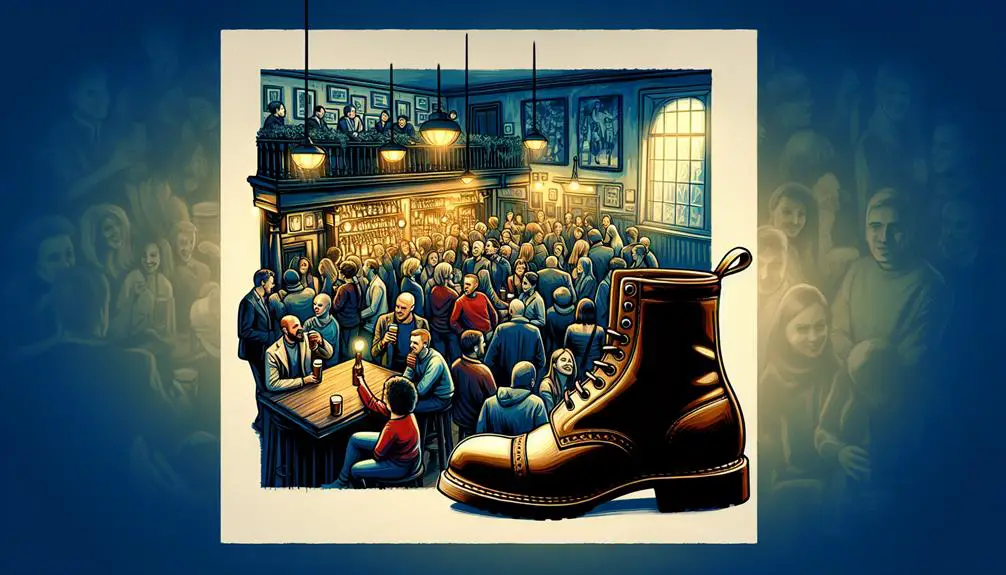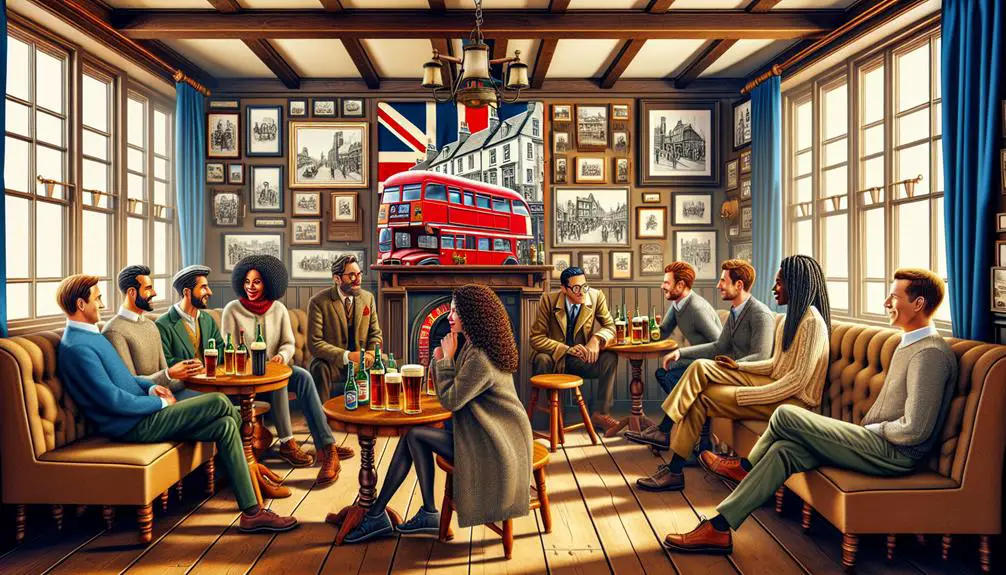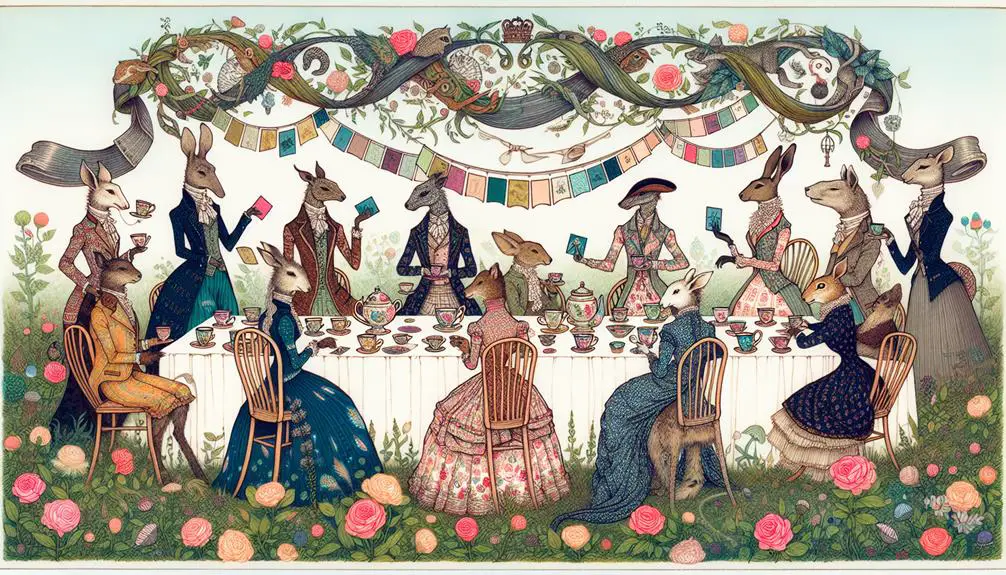You might think that deciphering British slang requires being a native or a linguist, but breaking into the colorful lexicon, especially the term 'legless,' is more accessible than you'd expect.
This term, rich in cultural nuance, extends beyond its literal meaning to paint a vivid picture in social contexts. As we unpack its origins, usage, and the etiquette surrounding it, you'll find yourself intrigued by how a single word reflects broader cultural attitudes and practices.
Stick with us, and you'll soon grasp not just what it means to be 'legless' but also how language evolves within the lively tapestry of British culture.
Origins of 'Legless

The term 'legless,' often used to describe extreme intoxication, has a colorful origin deeply rooted in British slang. You'll find its essence not just in the humor and imagery it evokes but also in the rich tapestry of British social and linguistic history. It's a term that's evolved over time, yet its core meaning remains unmistakably vivid, painting a picture of someone so drunk, they can't even stand on their own two feet.
Delving into the etymology, you'll discover that 'legless' is more than just a casual term; it's a reflection of the British knack for playful, yet cutting descriptors. The word itself suggests a loss of control so profound that one's legs are deemed useless. This isn't just a modern invention; the concept has historical legs, so to speak, dating back to the 19th century. It's a testament to the enduring love of wordplay and the penchant for understatement that pervades British humor.
Analyzing the term further, you'll appreciate how 'legless' encapsulates a particular aspect of British culture. The pub, after all, has always been a central social hub in the UK, and the term mirrors the social interactions and communal experiences found within these establishments. It's not just about the act of drinking; it's about the shared experience and the communal lore that such terms foster.
In essence, 'legless' is more than a slang term; it's a cultural marker. It signifies a moment of shared understanding, a collective nod to the times when one might, quite literally, lose their footing after a night at the pub.
How 'Legless' Is Used
Understanding how 'legless' is utilized in conversation can offer deeper insights into its significance within British culture. This slang term, while seemingly straightforward, carries nuanced meanings that go beyond its literal interpretation. When you hear someone described as 'legless' in the UK, it's not about physical mobility but a state of intoxication. This colorful expression paints a vivid picture of someone who's had so much to drink that they might as well not have legs due to their inability to walk properly.
To create imagery in your mind, consider the following scenarios where 'legless' might be used:
- At a Pub: Picture a crowded pub on a Friday night, full of laughter and chatter. Amidst the revelry, there's always that one individual who's had one too many pints and is now struggling to stand, let alone walk. Their friends might jest, 'Looks like Jamie's gone completely legless tonight.'
- During a Celebration: Whether it's a wedding, birthday, or national holiday, celebrations often involve drinking. As the night wears on, and spirits flow freely, someone inevitably reaches the point of being 'legless'. It's a half-joking, half-concerned acknowledgment from their peers: 'Careful, or you'll end up legless before midnight!'
- In Retrospect: The morning after a night out, friends recounting their adventures might use 'legless' to describe the extent of their inebriation. It's a way to humorously address overindulgence, 'I don't remember much after I got legless.'
This usage underscores a cultural acceptance and humorous take on drinking and its effects, without delving into moral judgment.
Cultural Context

Delving into the cultural context, it's clear that British slang, like 'legless,' reflects a society where social drinking is both a norm and a significant aspect of communal life. The term 'legless' isn't just a casual expression; it's deeply embedded in the social fabric, illustrating not only the prevalence of alcohol consumption but also the communal and often humorous approach to discussing it. This slang embodies the lighthearted, yet candid, British attitude towards heavy drinking, serving as a linguistic mirror to the culture's open acknowledgment of alcohol's role in social interactions.
| Emotion | Description |
|---|---|
| Amusement | The term evokes laughter when shared among friends, highlighting the jovial aspect of British social life. |
| Camaraderie | 'Legless' fosters a sense of unity and shared experiences, as many can relate to the state it describes. |
| Acceptance | Its use signals a cultural acceptance of indulgence, albeit with a hint of self-deprecation. |
| Tolerance | Reflects a societal tolerance towards alcohol consumption, recognizing it as a facet of social bonding. |
| Reflection | Prompts introspection about the cultural norms and attitudes towards drinking. |
Understanding 'legless' requires recognizing its role beyond mere vocabulary. It's a social indicator, revealing attitudes towards alcohol, camaraderie, and the collective acceptance of indulgence within limits. The term, thus, isn't just slang; it's a cultural artifact, offering insight into how British society navigates the complex landscape of social drinking. This analysis underscores the importance of context in grasping the full spectrum of meaning behind slang, especially within cultures that cherish and uphold their idiomatic expressions as reflections of their societal values and behaviors.
Variations and Similar Slang
Exploring beyond 'legless,' numerous other British slang terms similarly illuminate the rich tapestry of the UK's social and cultural life. While 'legless' vividly describes a state of extreme intoxication, it's just the tip of the iceberg in a vast sea of expressions that capture the nuances of British humor, understatement, and euphemism. You'll find that these slang terms provide a window into the values, attitudes, and everyday experiences of people across the UK.
- 'Knackered': This term conveys a sense of being extremely tired or exhausted. It's akin to saying you're too drained to continue with an activity, painting a picture of someone slumped over in a chair after a long day's work.
- 'Gobsmacked': Imagine the shock on someone's face, mouth agape, unable to speak. This is the essence of being gobsmacked – utterly astonished or astounded by something unexpected. It captures a moment of pure surprise and disbelief.
- 'Bants' or 'Banter': Central to social interactions in the UK, banter refers to playful, teasing, and often sarcastic exchange of remarks among friends. It's a dance of words that balances on the fine line between humor and insult, fostering camaraderie and a quick wit.
These terms, much like 'legless,' are deeply embedded in the social fabric of British life. They offer insight into the linguistic creativity and the importance of context in understanding not just language, but the culture it represents. Each term, with its unique connotations and usage, enriches the dialogue about cultural identity and communication within the UK.
Etiquette and Reception

Navigating the nuances of British slang requires not only an understanding of its meanings but also an appreciation for the etiquette and reception of these terms in various social contexts. When you're engaging in conversations within the UK, it's crucial to recognize that the familiarity, setting, and audience play a significant role in how slang, such as 'legless', is perceived and received.
In casual, friendly environments, using slang can strengthen bonds, signaling an insider knowledge and a shared cultural understanding. It's seen as a relaxed and authentic way of communicating, bridging gaps between individuals. However, you'll find that in more formal settings or when conversing with individuals you're not closely acquainted with, relying heavily on slang may not be appropriate. It could lead to misunderstandings, as not everyone might be familiar with the terms, or it might even be considered disrespectful or unprofessional.
The term 'legless', for instance, is colloquially used to describe someone who's very drunk. While it might elicit a chuckle in a pub among friends, employing such slang in a business meeting or with someone's grandparents mightn't garner the same reception. It's about reading the room and understanding the cultural and social dynamics at play.
Furthermore, with the diverse cultures and languages that coexist in the UK, be mindful of how slang might be interpreted by non-native speakers or individuals from different backgrounds. What's humorous or benign in one context could be confusing or offensive in another.
Ultimately, your ability to adapt your language use according to the situation demonstrates not just linguistic skill but also cultural sensitivity and respect.
Frequently Asked Questions
How Has the Use of the Term 'Legless' Evolved in Digital Communication, Particularly on Social Media Platforms?
You've noticed that in digital communication, especially on social media, the term 'legless' has evolved to convey more nuanced meanings, often reflecting extreme states or situations, beyond its traditional usage.
Are There Any Notable Public Figures or Celebrities Who Have Popularized or Brought Attention to the Term 'Legless' in Recent Years?
You're diving into whether any celebrities have spotlighted the term 'legless' lately. While there's no clear standout, social media influencers often play this role, subtly shaping its popularity without a single notable figure leading the charge.
How Do Non-Native English Speakers or International Audiences React to or Interpret the Slang Term 'Legless' When They Encounter It in British Media or Conversations?
When you encounter "legless" in British media, you might be puzzled or amused, depending on your grasp of English slang. It's a quirky expression that can catch international audiences off guard, sparking curiosity or confusion.
Can the Term 'Legless' Be Found in Any Significant Literary Works or Popular Songs That Have Contributed to Its Spread Outside the Uk?
You might find "legless" weaving through the verses of songs or the pages of novels, subtly exporting British culture. It's in these artistic expressions that the term gains a global foothold, intriguing and baffling listeners alike.
What Are the Legal or Professional Implications of Using Slang Like 'Legless' in Formal Settings or Workplaces Within the Uk?
Using slang in formal UK settings can damage your professional image and undermine credibility. It's crucial you understand the context and audience before using such terms to avoid negative legal or professional consequences.
Conclusion
In diving into the depths of British slang, you've navigated through the origins and cultural nuances of 'legless', a term rich in character.
Picture a ship in choppy waters, sails billowing – that's akin to someone who's 'legless', navigating the evening without their usual steadiness.
It's a testament to the colorful tapestry of language, where words paint vivid images of our experiences.
Understanding 'legless' not only enriches your vocabulary but also offers a glimpse into the fabric of British culture, illustrating how slang evolves and endures.







